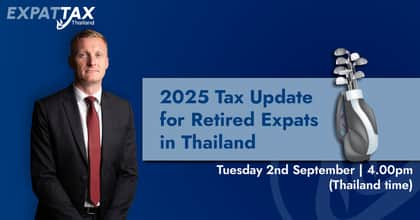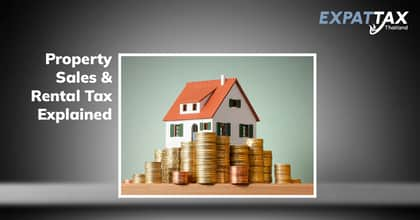于 2025 年 11 月 26 日更新,以反映内阁将该计划延长至 2028 年 12 月以及有关净计费计划的新信息。.
泰国对屋顶太阳能装置实行的新税收减免政策带来了难得的三赢局面:降低税收、减少电费支出,以及有机会成为该国推动实现更可持续未来的一部分。
如果您一年中的大部分时间都居住在泰国,那么您很可能被视为泰国税务居民--这意味着您很可能正在寻找各种方法来最大限度地利用现有的扣除额。泰国内阁最近批准的这一新激励措施,正是实现这一目标的实际机会。
注:尽管内阁已经宣布并批准了这些激励措施,但在最初宣布这些措施时,确认具体内容的详细皇家法令尚未颁布。. 注册我们的税务提醒,将最新消息直接发送到您的收件箱。
提供什么?
泰国政府已批准为在家中安装屋顶太阳能系统的个人提供慷慨的税收减免。您最多可以减免 200,000 泰铢 (包括增值税),从而有效降低了收入税额。
以下是您需要了解的信息:
- 谁有资格 在住宅物业上安装系统的任何个人(非公司)。您必须是电表上的同一人。
- 符合什么条件 10 kWp 以下的并网太阳能系统,由经认证的供应商安装,并提供完整的文件和批准。
- 什么时候 一旦该措施在《皇家公报》上公布,减税就会开始,并一直持续到 2028 年 12 月。您可在安装太阳能系统的纳税年度申请扣除。.
这不仅仅是为了减少您的税单。太阳能系统还意味着更少的能源账单,并有可能将多余的电力卖回电网。
您能申请吗?
是的,如果您是税务居民,并且每年申报,您就可以享受这项减免。国籍并不重要,但您需要拥有或租赁一处可以安装太阳能的房产。
如果您拥有一套公寓,您需要检查屋顶安装是否可行并获得批准。如果您租赁了房屋,只要房东同意并正确填写必要的文件,您就有资格申请扣除。安装注册和并网可能会遇到一些障碍,因此专业人士的帮助通常是个好主意。
您还可以将此减税优惠与其他减税优惠叠加使用,如 100,000 泰铢的抵押贷款利息减免或高达 300,000 泰铢的 ESG 投资津贴。
您能节省多少钱?
假设您花费 15 万泰铢安装了一个 5 kWp 的屋顶太阳能系统。如果您的税率为 20%,这意味着您可能节省 30,000 泰铢的税款。如果您全额支付 20 万泰铢,根据您的收入情况,最多可节省 4 万泰铢。
这还只是节税。再加上每月较低的电费和出售多余电力的潜在收入,其经济效益就更令人信服了。
将多余电力卖回电网
根据政府的净计费计划,家庭可以将剩余电力卖回给大都会电力局或省电力局。回购价格为每千瓦时 2.20 泰铢,而平均零售价格约为 4 泰铢。符合条件的系统功率不超过 10 千瓦,协议有效期可长达十年。全面净计量计划仍在考虑之中,该计划将以全额零售价对太阳能发电进行补偿。.
一个真实的例子
您退休后居住在清迈。您在家中安装了一套价值 15 万泰铢的太阳能系统。您可以在 2025 年或以后的申报表中申请全额扣除,从而节省 30,000 泰铢的税款。随着时间的推移,您的电费支出将减少一半,甚至还可以通过向电网输送能源赚取小额回报。.
这是一项明智的投资,也是让您的财务状况与您的价值观保持一致的简单方法。
看点
与任何税收激励措施一样,也有一些需要注意的事项:
- 获得批准: 系统必须与电网连接并正确注册。
- 文件很重要: 您需要完整、准确的发票和安装审批。
- 物业规则 外国人不能拥有土地,但可以拥有公寓或租赁房屋。您可能需要获得房东的合作,并找到电网登记的变通办法。
- 审计风险: 如果您汇出国外资金支付系统费用,请确保正确申报。
如果您对这项税收优惠政策感兴趣,我们可以帮助您确保一切申报正确无误。
最终想法
泰国的可再生能源税收激励措施为 Airbnb 运营商提供了一个引人注目的机会
这项税收激励措施提供了一种简单的方法,可以减少您的税单,降低您的电费,并支持绿色泰国的建设。该计划将持续到 2028 年 12 月,现在正是探讨屋顶太阳能是否适合您家的好时机。.
使用太阳能不仅能节省资金,还能使您的房产在不断变化的市场中更具竞争力,并为泰国向更绿色的未来过渡做出贡献。
了解有关泰国税务的最新消息及其对您的影响、 注册获取我们的税务提醒如果您对此或其他税务问题有任何疑问,请与我们的团队免费通话。


